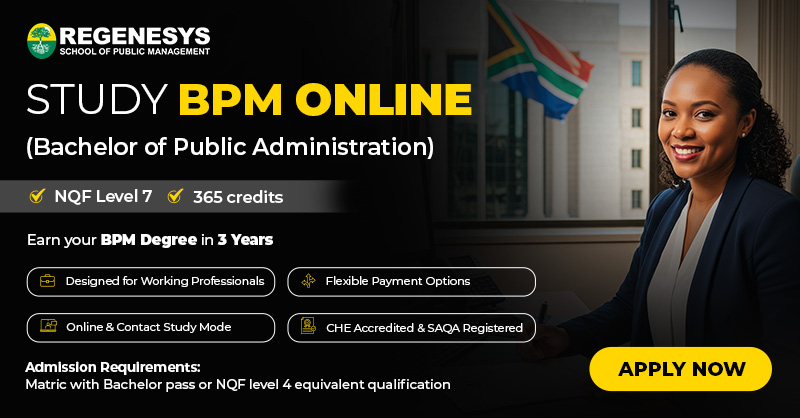The Bachelor of Public Management (BPM) in South Africa is a three-year undergraduate degree designed to prepare future leaders for the public sector. This programme equips students with essential skills in leadership, governance, policy analysis, and strategic decision-making, enabling them to make practical contributions to government, NGOs, and development organisations. Graduates gain knowledge in areas such as public finance, human resources, and community development, equipping them for diverse roles that drive social impact and improve public service delivery.
This article includes an overview of the BPM programme, admission requirements, core modules, and career opportunities for graduates.
Table of Contents

Why Study BPM In South Africa?
Studying a Bachelor of Public Management (BPM) in South Africa is a pathway to leadership, community impact, and career advancement. In a country where effective governance and strong public service are vital for social and economic growth, this degree equips you with the tools to address real-world challenges while building a rewarding career.
Listed below are some of the reasons to study BPM in South Africa:
- High demand for Public Sector professionals – South Africa needs skilled leaders who can design policies, improve service delivery, and drive transformation across government and development organisations.
- Versatile career options – A BPM graduate can work in diverse fields, including government agencies, NGOs, international organisations, financial institutions, and community development projects.
- Strong foundation for Postgraduate Studies – With its NQF Level 7 accreditation, the BPM degree serves as a stepping stone to advanced studies in public administration, governance, and development management.
In short, choosing this degree means choosing a career that not only benefits you but also makes a meaningful impact on society.
Core Modules
The Regenesys Bachelor of Public Management curriculum is designed to provide students with a strong academic foundation in governance, leadership, and service delivery. Each module introduces critical aspects of public sector management, ensuring that graduates not only understand the theory but can also apply it in practical settings.
These are some of the core modules:
- Economics – Provides an introduction to micro and macroeconomics, equipping students with analytical skills to understand how economic factors influence public policy and resource allocation.
- Public Finance Management – Focuses on budgeting, expenditure control, and financial accountability in the public sector, helping students master effective resource management.
- Public Human Resource Management – Explores recruitment, performance management, and labour relations, with an emphasis on developing and managing people in government institutions.
- Public Management – Introduces the fundamentals of public sector administration, including organisational structures, decision-making processes, and service delivery strategies.
- Public Policy Management – Examines how policies are formulated, implemented, and evaluated, while highlighting the role of governance and stakeholder engagement.
- Public Strategic Management – Equips students with tools to set long-term goals, plan strategically, and lead organisations effectively in dynamic public sector environments.
Through these modules, students develop a well-rounded perspective of public management, gaining the knowledge and competencies required to address the unique challenges facing South Africa’s public sector.
Also read, Is a Bachelor of Public Management in Demand in South Africa?
Skills You Will Gain From A BPM Degree
The Bachelor of Public Management (BPM) is structured to provide both theoretical knowledge and practical skills that can be applied in real-world governance and development contexts. Each module in the programme is carefully designed to build specific competencies, ensuring that graduates are not only academically prepared but also job-ready.
The skills gained from some of the core modules include:
- Analytical and Economic Reasoning – Develops the ability to understand how economic trends affect policy-making, resource distribution, and national development.
- Financial Planning and Accountability – Builds expertise in budgeting, financial oversight, and effective resource allocation, preparing you to manage public funds responsibly.
- People and Organisational Management – Equips you with skills in recruitment, performance management, labour relations, and conflict resolution in public institutions.
- Administrative and Leadership Skills – Provides a foundation in organisational structures, decision-making, and service delivery processes essential for leadership roles.
- Policy Analysis and Governance – Enhances your ability to design, evaluate, and implement policies while engaging diverse stakeholders.
- Strategic Thinking and Long-Term Planning – Builds strategic planning and leadership skills that enable you to guide organisations towards long-term goals.
By connecting each skill directly to its core module, the BPM degree ensures that you graduate with a comprehensive toolkit for tackling South Africa’s governance and development challenges.
Overview of the Bachelor of Public Management at Regenesys
The Bachelor of Public Management (BPM) at Regenesys School of Public Management is designed to prepare students for leadership roles in governance and development. It blends academic theory with real-world case studies, ensuring graduates are not only knowledgeable but also work-ready.
With a flexible study mode and supportive faculty, this CHE-accredited programme empowers students to pursue meaningful careers in public service.
The programme details include:
- Duration: 3 years
- NQF Level: 7
- Credits: 365
- SAQA ID: 97259
- Study Mode: Contact or Online learning
- Intakes: February, March, July, October
This structure makes the BPM course accessible to both full-time students and working professionals seeking to advance their qualifications while maintaining flexibility.

Bachelor of Public Management Admission Requirements
Admission into the Bachelor of Public Management (BPM) is designed to ensure that students have the foundational knowledge and skills to succeed in a demanding but rewarding programme. Regenesys offers multiple entry routes to accommodate both school leavers and working professionals who want to advance their careers in governance and public service.
The entry requirements include:
- A Matric with a Bachelor Pass or an NQF Level 4 equivalent qualification.
- A relevant NQF Level 5 qualification from an accredited institution, as recognised by SAQA.
- Completion of the Regenesys Higher Certificate in Public Management, which provides a direct pathway into the BPM degree.
- Proficiency in Mathematics and English at NQF Level 4, with strong written and oral communication skills.
- Basic computer literacy, including access to an internet connection and necessary IT resources for online or contact learning.
This flexible admission structure ensures that a wide range of learners from fresh matriculants to working professionals can access the BPM qualification and take their first step towards leadership in the public sector.
Read the article, How Much Is A Salary Of A Bachelor Of Public Management Graduate In South Africa?
Career Opportunities After A BPM Qualification
A Bachelor of Public Management (BPM) opens up a variety of career paths in government, NGOs, and development organisations. The degree equips you with practical skills in leadership, policy, finance, and community engagement, making you well-prepared for roles that have a direct impact on society. Whether your goal is to manage projects, design policies, or lead community initiatives, this qualification offers multiple opportunities for professional growth.
The career paths that BPM graduates can explore include:
- Project Manager – Oversee and implement government or community projects, ensuring they are delivered on time, within budget, and with measurable impact.
- Finance Manager – Manage budgets, public funds, and financial resources in state institutions or development organisations, maintaining transparency and accountability.
- Community Service Officer – Work at the grassroots level to deliver essential public services, address citizen concerns, and foster stronger connections between the government and communities.
- Public Policy Analyst – Research, evaluate, and inform the development of public policies to enhance governance, service delivery, and social development outcomes.
- Human Resource Manager – Handle recruitment, training, and workforce management in public sector organisations, with a focus on ethical and practical HR practices.
- Community Development Manager – Design and lead programmes that uplift communities, drive social change, and promote sustainable development initiatives.
These career options demonstrate the versatility of a BPM course, enabling graduates to pursue leadership positions across multiple sectors while making a meaningful contribution to society.
Read more on Exploring BPM Niche Roles in South Africa: Career Paths and Opportunities
Conclusion
The Bachelor of Public Management (BPM) is a stepping stone towards leadership, service, and impact in the public sector. By combining theory with practical learning, this course equips graduates with the skills to lead projects, manage resources, and influence policy. Whether you aspire to work in government, NGOs, or development organisations, a BPM qualification provides the knowledge and confidence to make a real difference in society.
Choosing to study at Regenesys Education means joining a vibrant learning community that emphasises ethics, innovation, and community development. With the skills and knowledge gained, you will be prepared to unlock diverse career opportunities and grow as a leader in the public sector. Apply now with Regenesys Education and begin your BPM journey.

BPM Course in South Africa – FAQ
What is the Bachelor of Public Management (BPM)?
It is a three-year undergraduate degree focused on governance, leadership, finance, policy, and community development in the public sector.
How long does the BPM degree take to complete?
This NQF Level 7 programme has been structured to be completed in 3 years with full-time study.
What are the admission requirements for BPM?
Applicants should have completed a Matric (Bachelor’s pass/NQF 4 equivalent), a relevant NQF Level 5 qualification, or a Regenesys Higher Certificate in Public Management, along with proficiency in English, Mathematics, and basic computer skills.
What careers can I pursue with a BPM qualification?
Graduates can explore careers as Project Managers, Finance Managers, Public Policy Analysts, Community Service Officers, Human Resource Managers, or Community Development Managers.
Can I study BPM online at Regenesys?
Yes, the programme is available in both online and contact (on-campus) modes, giving students flexibility based on their needs.







